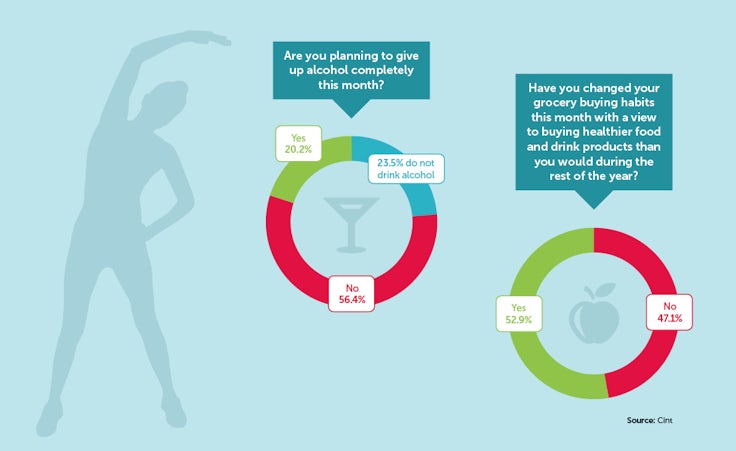Brands capitalise on health-driven resolutions
The first month of the year has seen a surge in health-conscious behaviour, demonstrating that tactical marketing in January has benefited brands pushing at an open door.

Over half of UK adults have changed their grocery buying habits this month in an attempt to live healthier lifestyles, new research shows. The study reinforces the annual trend of January presenting abundant opportunities for health brands to acquire new customers, with 42% of consumers claiming they are more concerned about their health and fitness than they were this time last year.
The survey of over 1,000 UK adults, commissioned by Marketing Week and carried out by Cint, a provider of market research tools, shows that 41% of people went on a diet this month. When asked to name the items they are cutting down on, respondents selected a wide range of brands and food groups including Coca-Cola, McDonald’s and sugary and fatty foods.
Food and drink brands often launch tactical campaigns in January in an effort to engage with health-conscious consumers. Danone’s healthy yoghurt brand Activia, for example, is seeking to create a sense of community around people’s new year’s resolutions by running a social media campaign called the ‘Healthy Tummy Movement’.
Last week the brand announced that 25,000 people had “joined the movement” since the start of the year by liking, commenting or sharing content related to the campaign. Activia is also promoting the initiative by offering daily prizes throughout January and by running a TV advert featuring presenter Gok Wan.
However the research suggests that people’s new year health drives are often short-lived. Thirty-eight per cent of respondents agree that they often give up on diet plans after a few weeks, compared to 22% who disagree, while 48% say they find it very hard to stick to health plans over the long term against 19% who disagree.

The government is seeking to encourage people to make long-term lifestyle changes with another new year advertising campaign for its Change4Life initiative. This month’s campaign focuses solely on sugar intake and on encouraging families to make “simple swaps” such as substituting fizzy beverages for sugar-free drinks and sugary cereals for wholewheat biscuit options.
Public Health England has enlisted six supermarkets to support the campaign by running point of sale activity and money-off vouchers to prompt people to make the swaps. Coca-Cola is also partnering with Change4Life for the first time this month by promoting its low-sugar or sugar-free options such as Coke Zero and Diet Coke as alternatives to the regular variant.
“We know from past campaigns that making simple swaps works and makes a real difference,” says Kevin Fenton, national director of health and wellbeing at Public Health England. “This year we wanted to be even more single minded in our approach, which is why we are focusing on sugar alone.”
In addition to healthier diets, the Cint research reveals big changes in people’s alcohol consumption this month, with 45% saying they have cut down on alcohol and 20% that they have given it up completely. Women are more likely to make new year’s resolutions to reduce their alcohol intake (48%, compared to 42% of men), while drinkers aged 23-35 are most conscious about cutting back, with 52% of this demographic drinking less in January compared to 38% of people aged 56-70.
‘Dry January’ has become a common term for people’s post-Christmas efforts to avoid alcohol and is often used as a fundraising tool by charities including Alcohol Concern. However this month several pub and bar chains have sought to counter this trend by launching a rival ‘Try January’ campaign that encourages people to experience new food and drink options on their menus.
Beyond food and drink consumption, the survey shows that a significant proportion of UK adults have altered their fitness habits in the early weeks of this year. For example 12% said they planned to join a gym this month, while 17% of existing gym members confirmed they would pay for extra fitness classes or gym sessions.
In addition, 29% say they now have a fitness-tracking app on their mobile device or are planning to download one, while 18% own or are planning to buy a wearable device such as a wristband for monitoring their health and fitness.
A huge array of wearable technology was on display at the Consumer Electronics Show in Las Vegas this month, ranging from sensor-enabled sports tops to wristbands that tell women when they are most likely to conceive a baby. As this technology continues to advance in 2015, growth in the opportunities for marketers to forge deeper engagement with health-conscious consumers also looks set to accelerate.






